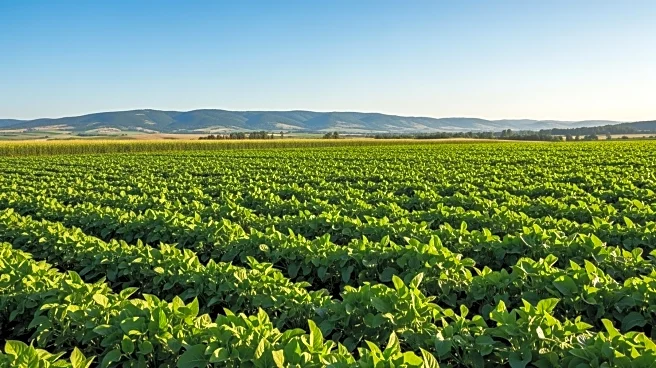What's Happening?
Tripura's Dhalai and Khowai districts are on the verge of achieving self-sufficiency in food grain production, as announced by the state's Agriculture and Farmers’ Welfare Minister, Ratan Lal Nath. This development follows the launch of three major agricultural schemes: PM Dhan Dhanya Krishi Yojana, National Mission on Pulses, and National Mission on Natural Farming. These initiatives aim to boost agricultural sustainability across Tripura, with a focus on urban and natural farming. The PM Dhan Dhanya Krishi Yojana will cover 100 districts nationwide, including Tripura's North District, which currently has low food grain productivity. The state ranks sixth in rice production in India, with an average yield of 3,299 kg per hectare, surpassing the national average of 2,882 kg. Despite challenges such as insect attacks, Tripura is making strides towards self-sufficiency in potato and onion production, with organic and natural farming practices being encouraged.
Why It's Important?
The achievement of food-grain self-sufficiency in Tripura's districts is significant for the state's agricultural sector and overall economic stability. By reducing dependency on imports, Tripura can enhance its food security and support local farmers. The focus on natural and organic farming aligns with global trends towards sustainable agriculture, potentially increasing the state's competitiveness in the agricultural market. The success of these initiatives could serve as a model for other regions in India, promoting similar strategies to boost agricultural productivity and sustainability. The involvement of Farmer Producer Organizations (FPOs) is crucial, as they play a vital role in increasing farmers' income and ensuring sustainable growth. This development could lead to increased investment in the agricultural sector, benefiting both the local economy and the broader national agricultural landscape.
What's Next?
The state government plans to continue prioritizing the production of pulses and maize, where Tripura still lags behind. Efforts to expand agricultural areas and improve food grain production in North Tripura are ongoing. The government is also focusing on urban and horticultural farming in densely populated areas like the West District. The success of these initiatives will depend on favorable weather conditions, particularly rainfall, which is crucial for crop growth. The expansion of FPOs and the push for natural and organic farming are expected to play a significant role in achieving these goals. Monitoring and addressing challenges such as insect attacks will be essential to maintain high productivity levels. The nationwide launch of these schemes by Prime Minister Narendra Modi and Union Agriculture Minister Shivraj Singh Chouhan indicates strong governmental support, which could lead to further policy developments and resource allocation to support Tripura's agricultural ambitions.
Beyond the Headlines
The emphasis on natural and organic farming in Tripura reflects a broader shift towards sustainable agricultural practices, which could have long-term environmental benefits. By reducing reliance on chemical fertilizers and pesticides, these practices can improve soil health and biodiversity. The success of Tripura's agricultural initiatives could inspire other states to adopt similar strategies, potentially leading to a nationwide transformation in farming practices. Additionally, the increased productivity and self-sufficiency in food grains could contribute to improved nutrition and health outcomes for the local population. The role of FPOs in boosting farmers' income highlights the importance of collective action and community-based approaches in achieving agricultural sustainability.









